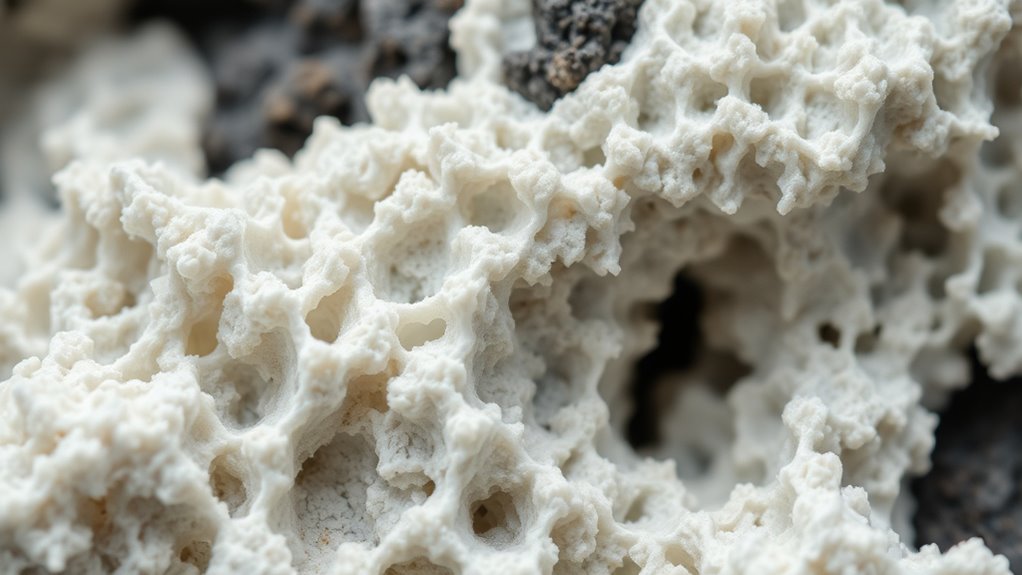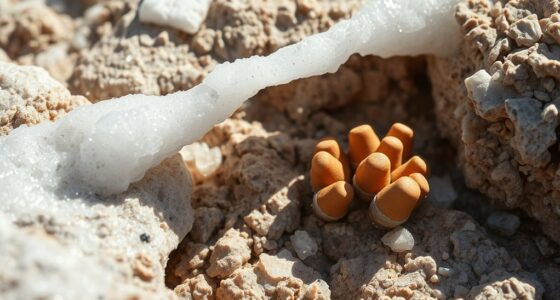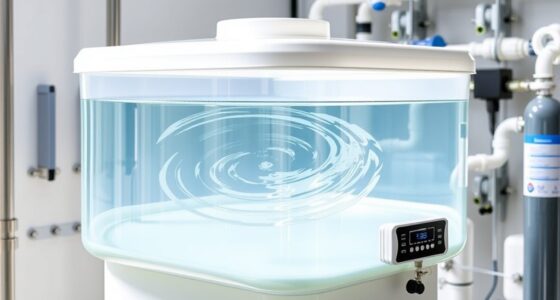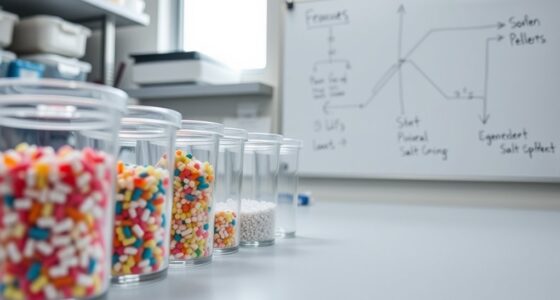Scale is a buildup of minerals like calcium and magnesium that form on surfaces when hard water evaporates or is heated. These deposits, often found in pipes, fixtures, and appliances, cause reduced water flow and efficiency issues. As minerals crystallize, they create crusty, chalky deposits that can damage your plumbing over time. Understanding how scale forms helps you learn ways to prevent or remove it, so keep exploring for effective solutions.
Key Takeaways
- Scale is a crusty deposit formed by minerals like calcium and magnesium crystallizing on surfaces.
- Water hardness caused by dissolved calcium and magnesium leads to mineral buildup.
- Heating or evaporation triggers minerals to come out of solution and form scale.
- Scale buildup can clog pipes, reduce water flow, and damage appliances.
- Preventing scale involves water softeners, regular cleaning, and descaling methods.

Calcium and magnesium deposits are common issues that can affect your plumbing, appliances, and water quality. These deposits are the result of water hardness, which occurs when your water contains high levels of dissolved minerals like calcium and magnesium. When water with high mineral content flows through your pipes, fixtures,, and appliances, it leaves behind mineral buildup—also known as scale—that can cause problems over time. Understanding what scale is and how it forms can help you prevent or address these issues before they become costly or damaging.
Calcium and magnesium deposits cause scale buildup, impacting plumbing, appliances, and water quality over time.
When water is hard, it carries these minerals in solution. As the water heats or evaporates, the dissolved calcium and magnesium come out of solution and crystallize on surfaces. This process creates a crusty, flaky buildup that adheres tightly to plumbing, fixtures, and appliances. Over time, this mineral buildup can restrict water flow, reduce the efficiency of appliances like dishwashers and water heaters, and even cause damage if left untreated. The more mineral-rich your water, the more likely you are to encounter significant scale formation, especially in areas with naturally hard water sources.
You might notice signs of mineral buildup early on, such as reduced water pressure from your faucets, soap scum forming easily, or your appliances working less efficiently. If you notice white, chalky deposits around faucets or on showerheads, it’s a clear indicator of calcium and magnesium deposits. These deposits not only diminish the appearance of fixtures but also compromise their functionality. Over time, mineral buildup can clog pipes or cause corrosion, leading to expensive repairs or replacements.
Addressing water hardness and mineral buildup requires a combination of preventative and remedial measures. Installing water softeners can effectively reduce the mineral content in your water, preventing scale formation before it starts. Regular cleaning of fixtures and appliances also helps remove existing deposits, maintaining their efficiency. In some cases, descaling products or vinegar solutions can dissolve mineral buildup on surfaces, but persistent or severe deposits may require professional intervention. Additionally, understanding the formation process of scale can help you choose the most effective strategies for mitigation.
In essence, understanding what scale is and how it forms empowers you to take control of your water quality. By managing water hardness and preventing mineral buildup, you protect your plumbing, extend the lifespan of your appliances, and maintain better water quality for everyday use. Recognizing the signs early and taking proactive steps will save you money, reduce maintenance hassles, and keep your home running smoothly.
Frequently Asked Questions
How Does Scale Formation Affect Plumbing Systems Over Time?
Scale formation causes your plumbing system to slow down as mineral deposits build up inside pipes. This leads to pipe corrosion, weakening the pipes over time, and can cause leaks or bursts. Additionally, it reduces water efficiency by restricting flow, making your system work harder and wasting energy. Regular maintenance and water treatment can help prevent scale buildup, protecting your pipes and ensuring peak water flow and efficiency.
Are Calcium and Magnesium Deposits Harmful to Human Health?
You might notice cloudy water or mineral buildup on fixtures, but calcium and magnesium deposits aren’t typically harmful to your health. While mineral accumulation from water hardness can affect appliances and skin, it usually doesn’t pose direct health risks. Still, drinking excessively hard water over time might lead to minor issues. Focus on maintaining good water quality, and enjoy the benefits of mineral-rich water without worry, knowing it’s generally safe.
Can Scale Buildup Be Completely Removed From Appliances?
Yes, scale buildup can be completely eliminated from appliances with proper appliance maintenance and mineral filtration. Regular descaling using vinegar or commercial descaling agents helps eliminate existing deposits. Installing a water softener or filtration system reduces calcium and magnesium levels, preventing future buildup. Consistent maintenance ensures your appliances operate efficiently and last longer, saving you money and hassle in the long run.
What Are the Best Methods to Prevent Scale Deposits?
To prevent scale deposits, you should use water softening systems, which remove calcium and magnesium before they cause buildup. Regularly applying descaling techniques, like vinegar or commercial descalers, helps keep appliances clean and efficient. Additionally, installing filters or conditioners can reduce mineral content, while maintaining proper water temperature and flow rate prevents scale from forming. Consistent maintenance assures your appliances stay scale-free and operate smoothly.
Does Water Temperature Influence Calcium and Magnesium Deposit Formation?
Yes, water temperature influences calcium and magnesium deposit formation because higher temperatures decrease mineral solubility, making these minerals more likely to precipitate out and form scale. When water gets hotter, calcium and magnesium tend to settle on surfaces, especially in appliances like water heaters and boilers. To minimize deposits, keep water temperature moderate and consider using water softeners or descalers, which help prevent scale buildup effectively.
Conclusion
Now that you understand calcium and magnesium deposits, you’ll see how they silently build up like an unstoppable force. These deposits can turn your water into a fortress, making everyday tasks more difficult. But with knowledge and proper care, you can keep these minerals in check. Don’t let scale take over your home like a relentless monster—take action today and protect your appliances and plumbing. Your water, and your wallet, will thank you for it.









